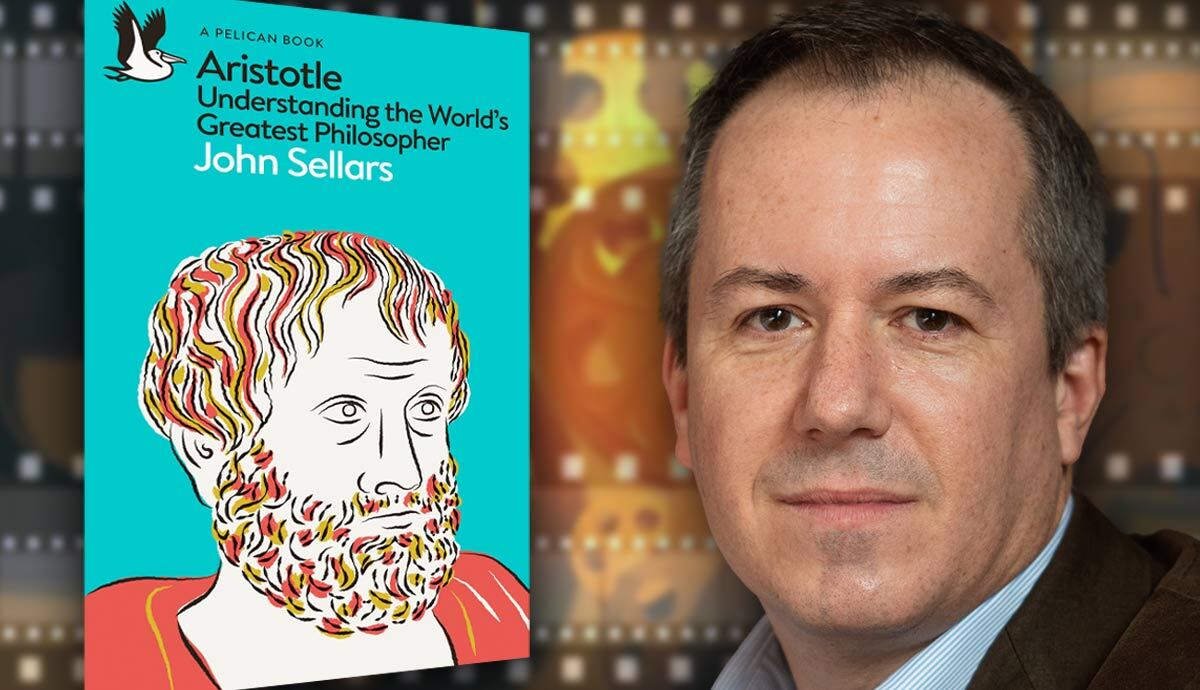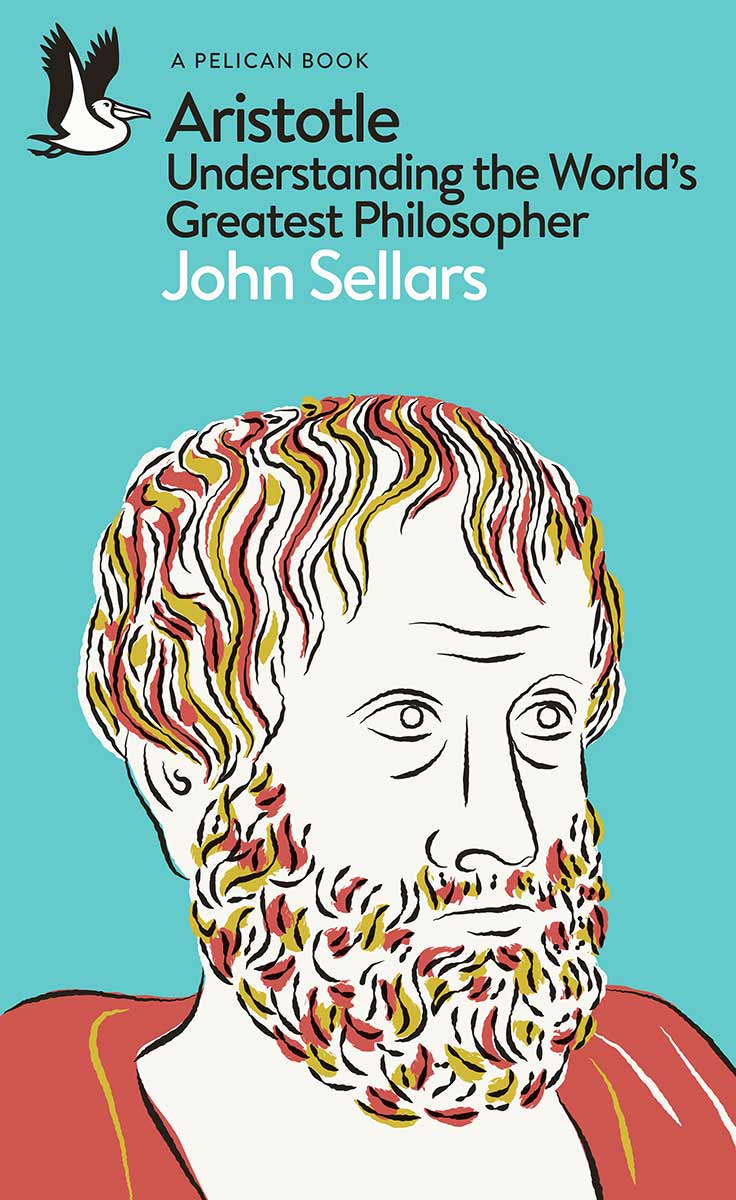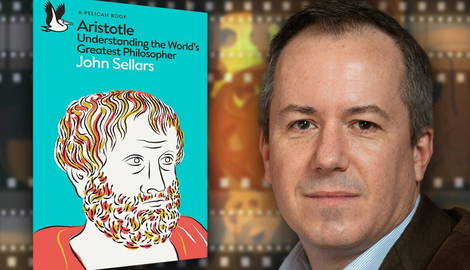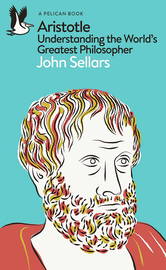
Interview by Antonis Chaliakopoulos & Natalie Noland
Is Aristotle’s philosophy still relevant? What does it mean to be an Aristotelian today? Did Aristotle’s thought influence Alexander the Great? John Sellars* answers these and many more questions as he talks to Natalie Noland and Antonis Chaliakopoulos about his forthcoming book Aristotle: Understanding the World’s Greatest Philosopher.
*John Sellars is Reader in philosophy at Royal Holloway, University of London, a visiting Research Fellow at King’s College London and a Member of Wolfson College, Oxford. He is the author of Lessons in Stoicism and The Fourfold Remedy. His books have been translated into over a dozen languages.
“Aristotle is without doubt one of the greatest philosophers who ever lived, if not the greatest.”

What made you want to write about Aristotle?
Aristotle is without doubt one of the greatest philosophers who ever lived, if not the greatest. As a consequence, he can be quite an intimidating figure, which is not helped by the fact that his texts are often quite dense and challenging. The introductions to his work that I had read in the past never really gave me a way into his thought. So, I wanted to write the sort of book that I would have found helpful when I first started out in philosophy. I thought that would be a worthwhile thing to do, but also an interesting challenge!
What is Aristotle’s most important work, and why?
Aristotle wrote so much in so many different areas that it would be incredibly difficult to pick one and say that it is the most important work. I think anyone’s answer to that question will depend on their own interests. The most important are probably the Metaphysics, Physics, On the Soul, and Nicomachean Ethics. But others might prefer the Politics, Poetics, or Rhetoric.
Why is Aristotle’s philosophy significant today? Why have his beliefs endured for thousands of years?
There are certainly some Aristotelian beliefs that have endured all the way through, and others that fell out of view for a while and have been revived more recently. But I think the reason why he has been so influential and continues to be is the way in which he does things. His method and approach to questions is careful, tentative, takes into account past views and common opinions, and pays attention to how things actually are through observation. What he offers is a model of how to go about doing philosophy (and science and social science), a model that has defined what academic research looks like in multiple disciplines.
“Aristotle introduced the idea that something might potentially exist”

Aristotle’s written works and legacy span a variety of fields, from philosophy to politics to science. Are there any common threads across his wide-ranging beliefs?
That’s a complicated question! I suppose one key idea that we find cropped up in multiple contexts in his work is the distinction between something being actual and potential. Before Aristotle, people tended to think about things either existing or not. Aristotle introduced the idea that something might potentially exist. The acorn is not an oak tree, but it has the potential to become one; the small child is not a rational adult, but has the potential to be one; and so on.
This is a key idea in Aristotle’s biology and metaphysics, but it also plays an important part in his ethics.
In order to be a good human being, someone will need to fulfill their potential as a human being. If humans are rational animals, then to be a good example of a human, we’ll need to be rational. That means actually being rational — using our reason to help us make choices in our daily lives. For Aristotle, whenever we want to try to understand something, we should think about not only what it is right now but also what it has the potential to become and also to do. You don’t really know what an acorn is, for instance, if you don’t know that it has the potential to grow into an oak tree.
How did Aristotle’s views differ from his contemporaries? How were they similar?

I’ve just suggested one way in which Aristotle differed from many of his predecessors. In part, this was his response to the philosophy of his teacher, Plato. In the area of metaphysics, Aristotle differed quite a bit from Plato. However, when it came to ethics, Aristotle shared quite a lot in common with Socrates and Plato before him. They all stressed the importance of virtue in thinking about a good human life.
In his Nicomachean Ethics, Aristotle often argues against various things that Socrates had said, all the time sharing the same broad approach. A number of times, he comments that Socrates was partly right and partly wrong. This is a nice insight into Aristotle’s way of thinking. He didn’t reject anyone’s views wholesale but instead looked for what seemed plausible and tried to take that further.
How did Aristotle’s relationship with Plato and his time at the Academy influence his philosophical outlook?
It is tempting to say that Plato was the most important influence on Aristotle, and in many ways he was. Aristotle’s mature thought can be seen as constantly in dialogue with his old teacher, taking over some ideas and challenging others. There’s no denying that Aristotle’s philosophy could not have existed without Plato’s. Having said that, the most distinctive ideas in Aristotle’s works — such as the distinction between the actual and potential I mentioned earlier — came about after he had left the Academy and probably developed out of his own interest in biology, something without any Platonic precedent.
“Aristotle says that whenever faced with a choice, always aim for the intermediate and avoid the extremes…This may not sound especially inspiring or exciting, but that does not mean that it is not true!”

What are the most important takeaways from Aristotle’s views on virtue?
I suppose the central and most famous idea is that virtues are ‘means’ or ‘intermediates’ between two opposing vices. This is how he defines almost all virtues. So, for example, courage is something that sits in between the two vices of recklessness at one end and cowardliness at the other. In general, Aristotle says that whenever faced with a choice, always aim for the intermediate and avoid the extremes. The best path is going to be somewhere in the sensible middle ground. This may not sound especially inspiring or exciting, but that does not mean that it is not true!
Many of Aristotle’s naturalistic observations were remarkably ahead of their time. What, in your view, was his most groundbreaking contribution to science?
Aristotle made many contributions to biology, most of which I’m not fully qualified to judge, and of course, he also said many things that are now obviously wrong. It is easy for critics to pull out something false from what he said in order to dismiss him, but there are also lots that are true, and so, to us seems just obvious.
One of the things I find fascinating is his interest in trying to understand animals as organisms made up of different parts that each have their own function. Those parts can only really be understood as parts of the larger whole.
What was Aristotle’s view of art? Can you tell us a bit about the concept of “catharsis” in Aristotelian aesthetics?
Aristotle wrote about drama — both tragedy and comedy — and this was his main area of interest when it came to art. He wanted to understand the structure of a good play and how all the different parts fit together. In this sense, his approach was not that different from the one he used in biology: what are all the parts, what does each one do, and how do they work together to create a whole?

Equally, it also shares something in common with his approach to ethics: if we want to be able to create good drama, we shall need to understand how good drama works and what its function or purpose is. For Aristotle, one of the functions relates to social cohesion. Going to the theatre (or cinema) brings members of a community together for a shared experience that can help to strengthen the group.
Another function introduces the idea of catharsis. This is the idea that by witnessing extreme emotions played out on stage, we too go through an emotional experience, and that release of emotion — in a safe setting — can be good for us. It can also prepare us for handling emotions in real situations later on.
Aristotle served as the tutor of the young Alexander the Great. Did Aristotle’s teachings influence Alexander’s later life?

It is difficult to say for sure, but I’m inclined to say that Aristotle probably didn’t influence Alexander much at all. There are no obvious Aristotelian characteristics in Alexander’s behavior or personality. There’s one nice passage in the Nicomachean Ethics where Aristotle says that adolescent boys are not really mature enough to learn about ethics and would much rather be out horse riding and playing games. I wonder if this is a comment on his time trying to tutor Alexander!
Can you tell us a bit about the Lyceum? Have you visited the archaeological site in Athens?
Yes, I have visited the site, and in fact, I shall be going there again this month with some students. As with many of these places, there’s not a huge amount to see now, but it is still exciting to think that this was the place where Aristotle and his friends gathered for their philosophical conversations.
The Lyceum itself was a public gymnasium, like the Academy, and earlier philosophers such as Socrates used to go there too. As Plato had done at the Academy, Aristotle, and others met at this public place and later bought a private property close by as their base. When we refer to Aristotle’s school as ‘the Lyceum’, what we might actually mean is this private property close to the gymnasium. It certainly had a library — Aristotle was an avid book collector — and some of his writings suggest that maps and charts were used in teaching, so there were presumably other research materials there too.
“There are two ways to think about being an Aristotelian…To accept everything that Aristotle says…or to embrace his approach, his way of tackling problems, and his spirit of inquiry. I’d want to be an Aristotelian in that second sense”

You’ve written books about Stoicism and Epicurus. Between the three different philosophies – Stoicism, Epicureanism, and Aristotelianism – do you find yourself drawn to any of them over the others?
I’ve worked mainly on Stoicism, and that’s the one to which I’m drawn most. However, I think even someone drawn to Stoicism learns interesting things from Epicurus, as the Stoic Seneca did in antiquity. And although they differ in the details, Aristotle and the Stoics share the same broad approach to ethics, to the point that some commentators in antiquity claimed that they were saying the same thing just in different words. I wouldn’t go that far, but there is some common ground.
In my book on Aristotle, though, I argue that there are two ways to think about being an Aristotelian. The first way would be to accept everything that Aristotle says in the same way that one might talk about someone being a Stoic or an Epicurean. But I think there’s another way to be an Aristotelian, which is to embrace his approach, his way of tackling problems, and his spirit of inquiry. I’d want to be an Aristotelian in that second sense, and I see no reason why that cannot be combined with Stoicism.
In recent years, there has been an increased interest in Stoicism as a form of self-help/improvement philosophy able to improve individual lives. Does Aristotle’s work have the same capacity?
In principle, it does, and it is quite easy to imagine someone taking lessons from Aristotle’s ethics and promoting them today. Aristotle insists that there’s no point in just talking about virtue and justice and the like; one must try to act virtuously and justly and so on. So he puts great stress on putting things into practice. He also gives us some rules of thumb as to how to do this. I don’t imagine that it would inspire quite so many people as the Roman Stoics have done, but even so, I’m sure we could all learn some useful lessons from him.
John Sellars’ ‘Aristotle: Understanding the World’s Greatest Philosopher’ is published in paperback by Pelican Books on 29 February 2024.











